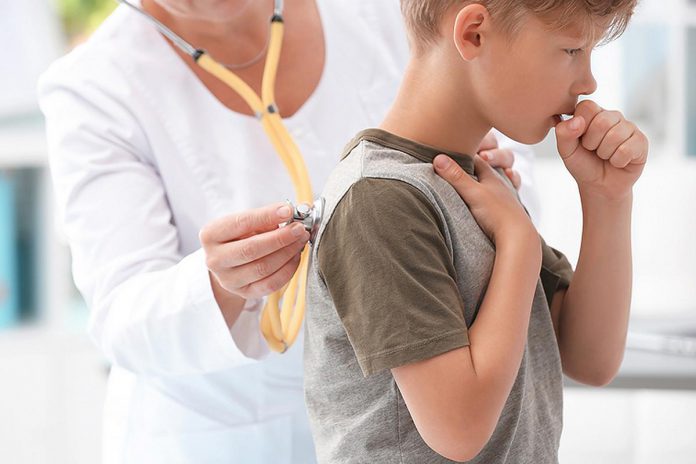The Haliburton Kawartha Pine Ridge District Health Unit (HKPRDHU) is alerting parents and caregivers that there are confirmed cases of pertussis, also known as whooping cough, in the City of Kawartha Lakes.
As a result, HKPRDHU is reminding parents and guardians to ensure their children’s immunizations are up to date and on file with the local health unit.
Pertussis is a serious bacterial infection that affects the throat and lungs. It was one of the most common childhood diseases and a cause of child mortality in the 20th century. Routine childhood immunization for pertussis, along with protection from polio, tetanus and diphtheria, has significantly decreased the number of cases of the disease.
Whooping cough can be introduced to communities through travel to countries with lower rates of vaccination, and it can circulate among those who are unvaccinated, under vaccinated, or those whose vaccine effectiveness has decreased over time, HKPRDHU noted in a media release.
It is very contagious and spreads via droplets from the noses and mouths of those who are infected, HKPRDHU said. While anyone can get whooping cough, it is most dangerous for children under the age of one year, and pregnant women.
“Immunization remains the best way to protect your child or yourself from getting sick with pertussis,” said Dr. Natalie Bocking, CEO and medical officer of health for HKPRDHU.
“Please familiarize yourself with the symptoms of pertussis and seek medical care if your child has these symptoms. Pertussis can be treated with antibiotics. Lastly, and most importantly, always ensure your child’s routine vaccinations are up to date and have been reported to the local public health unit.”
Once a person is infected by pertussis it can take up to 20 days for them to develop symptoms. The bacterial infection begins like a cold, with a very runny nose.
After a few days, the typical irritating cough begins that becomes more frequent and severe. Coughing may be followed by a “whoop” sound before the next breath.
The coughing can be so aggressive that it causes children to vomit or have trouble breathing, HKPRDHU noted. The cough is usually severe for two to three weeks and then starts to get better, but it can last up to one to two months.
Diagnosed cases of pertussis are treated with antibiotics.
In Ontario, a vaccine series to prevent pertussis is started in infancy with booster doses in adolescence and adulthood. HKPRDHU asks parents and caregivers to check their own immunization records, as they may be eligible for a publicly funded pertussis-containing vaccine when the next booster is due.
HKPRDHU is holding immunization clinics for students or people who do not have a health care provider. To book an appointment, call 1-866-888-4577, extension 1507, or visit the HKPRDHU’s immunization clinics web page.
According to the Government of Canada, pertussis is a disease that happens year-round everywhere in the world.
In Canada, between 1,000 and 3,000 people annually fall ill from pertussis. Worldwide, there are about 20 to 40 million cases of whooping cough and 400,000 deaths from pertussis each year.
Without treatment, pertussis can last for weeks or months, and can cause brain damage or even death, the federal government noted. “It is important that you and your children receive all of your vaccinations for protection of yourself and others.”
For more information about whooping cough, including what it sounds like, visit the Government of Canada’s pertussis web page.



























